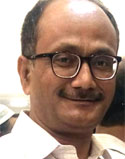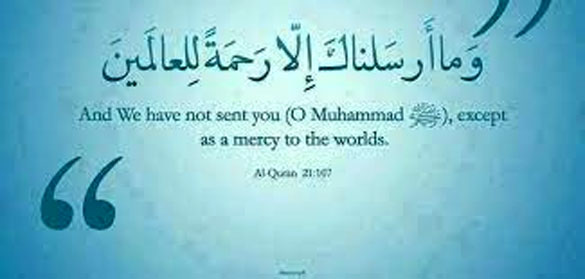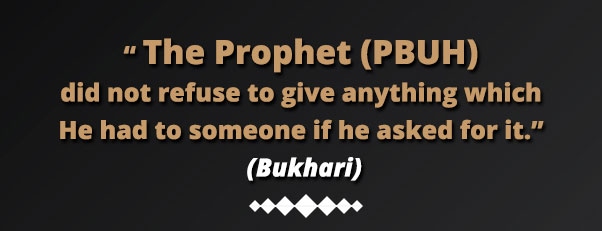
By Arman Neyazi, New Age Islam
4 June 2021
Human Beings Should Be Proud Of Having A Person Of Such Integrity, Humbleness And Modesty With The Traits Of Mercy And Equality On This Planet To Guide The Humanity And Give It Examples Of Living A Model Life
Main Points:
1. ‘Mercy to the world’, Prophet Muhammad (SAW) the Seal of the Prophets was a divine personality.
2. Prophet Muhammad (SAW) was the epitome of moral excellence with the traits of mercy and equality.
3. The honour that the Ummah of Prophet Muhammad (SAW) is bestowed upon are those which were not given to the Ummah of other Prophets.
4. Allah, the Most Merciful started blessing the soil of his birth with miraculous mercies from his birth.
-----
A merciful, kind, truthful, generous, humble and modest, Prophet Muhammad ﷺ, the divine man sent to the world as a ‘mercy to the world’ is truly unexplainable with the available words in the dictionary. ‘Mercy to the world’, Prophet Muhammad (SAW) the Seal of the Prophets was a divine personality as a human being among us on this planet earth.

The honour that the Ummah of Prophet Muhammad (SAW) is bestowed upon is that which were not given to the Ummah of other Prophets. The following part of the discussion between Allah, the Most Gracious, and Prophet Musa (AS) testifies the greatness of Prophet Muhammad (SAW) because even his Ummah is taken as the most honoured among all other Ummah who came before:
Allah said to him, “No, they are not your Ummah, they are Ummati Muhammad and you are going to be part of his Ummah on Judgment Day.”
Childhood Miracles of Prophet Muhammad (SAW)
Al-Abbas ibn Abd al-Muttalib was a paternal uncle and a Companion (Sahabi) of Prophet Muhammad (SAW) who gave his reason for entering into the fold of Islam in the following Hadees:
The Prophet’s uncle, Al-Abbas (r) said, Oh, Messenger of Allah, what made me enter into your religion was my witnessing a sign of your Prophethood. I saw you in your cradle talking tenderly to the Moon and pointing at it with your finger. It moved across the sky to wherever you pointed. Muhammad said, I was talking to it, and it talked to me, which distracted me from crying. I could hear the sound of its prostration under the throne. (Imam Ahmad Shihab ad-Din al-Qastallani, Sunnah.org)
Prophet Muhammad (SAW)’s childhood days were miraculous in the sense that Allah, the Most Merciful started blessing the soil of his birth with miraculous mercies. I mention here a very famous incident of his childhood that occurred when Halima, the wet nurse of Rasool Allah (SAW)adopted him and took him to her village. Consider the following from ‘Ar-Raheeq Al-Makhtum (The Sealed Nectar): Biography of the Prophet’:
It was a year of drought and famine and we had nothing to eat. I rode on a brown donkey. We also had with us an old she-camel. By Allah, we could not get even a drop of milk. We could not have a wink of sleep during the night for the child kept crying on account of hunger. There was not enough milk in my breast and even the she-camel had nothing to feed him. At length, we reached Makkah looking for children to suckle. Not even a single woman amongst us accepted the Messenger of Allah (Peace be upon him) offered to her. As soon as they were told that he was an orphan, they refused him. Every woman who came with me got a child to nurse and when we were about to depart, I said to my husband:
By Allah, I do not like to go back along with the other women without any baby. I should go to that orphan and I must take him. He said, there is no harm in doing so and perhaps Allah might bless us through him. So, I went and took him. When I lifted him in my arms and returned to my place, I put him on my breast and to my great surprise, I found enough milk in it. He drank to his heart's content, and so did his foster brother and then both of them went to sleep although my baby had not been able to sleep the previous night.
My husband then went to the she-camel to milk it and, to his astonishment, he found plenty of milk in it. He milked it and we drank to our fill and enjoyed a sound sleep during the night.
The donkey that she rode when she came to Makkah was lean and almost foundered; it recovered speed much to the amazement of Haleemah’s fellow travellers. Their barren land sprouted forth luxuriant grass and beasts came back to them satisfied and full of milk. (Al Raheeq Al Maktum)
Prophet Muhammad (SAW) And His Moral Excellence
Prophet Muhammad (SAW), although an Islamic prophet, is venerated even by them who belong to other religions and belief. Various faith leaders and non-Muslim scholars of social sciences, philosophy and writers of repute have described Prophet Muhammad (SAW) as an embodiment of modesty, honesty, equality, generosity and kindness in their epics and discussions.
Allah, the All-knower describes Prophet Muhammad (SAW) as a man of outstanding character’ and says in the following two Ayaat in the Holy Quran:
And you are truly ‘a man’ of outstanding character. (Surah Al-Qalam - 4) — Dr Mustafa Khattab, the Clear Quran
There has certainly been for you in the Messenger of Allah an excellent pattern for anyone whose hope is in Allah and the Last Day and [who] remembers Allah often. (Surah Al-'Ahzab: 21) - Sahih International
Above mentioned Ayaat establish Prophet Muhammad (SAW) a man who in his traits had the highest moral excellence. The Holy Quran never showed him as a superhuman personality but established him as the ‘most perfect man of all the human beings.
His friends and foes both took him in good stead but he never established any sense of superiority, not to talk of his Companions but even the common people. He won the heart of the world and obeyed the commands of Allah with a sense of humility, modesty and equality. Islam spread on the strength of his character traits that the world of even his time acknowledged. Consider the following three Ahadees that are an explanation of how Islam spread in Arabia and the whole world thereafter:
Once, a group of Jewish men entered upon the Prophet ﷺ, and said, “As Samu Alaikum” meaning “Death be upon you.” Upon hearing this, Aisha cursed them in reply, but the Prophet ﷺ advised her, “Be calm, O Aisha. Allah loves that a person is kind and lenient in all matters.” (Bukhari)
At the time of signing the Treaty of Hudaybiya, the Quraysh envoy, Suhayl bin Amr, demanded that the phrase “Messenger of Allah” written next to the name of Muhammad ﷺ should be cut off as Suhayl did not recognize him as such. Ali, being the scribe, refused to do so, but the Prophet ﷺ took the pen and struck off the phrase himself in the interest of peace. (Bukhari)
At the time of his demise, the Prophet ﷺ wore “a sheet and a thick lower garment.” Amr bin Al-Harith narrates, “[When he died] the Messenger of Allah ﷺ left neither a dinar nor a dirham, nor a male slave nor a female slave, nor anything else except his white riding mule, his weapons, and his land which he had given in charity to wayfarers.” (Bukhari)
The Prophet ﷺ would borrow money to fulfil his needs and that of his family even towards the end of his life. Ayesha reports,
“When the Messenger of Allah ﷺ died, his armour was mortgaged with a Jew for thirty Sa [measures] of barley.” (Bukhari)

Acknowledgement of the Greatness of Prophet Muhammad (SAW)
To understand Prophet Muhammad (SAW) and his life, it is necessary to know what others thought of him as a person and as a role model. Consider the following sayings of the famous non-Muslim philosopher, clergymen, historians, professors and statesmen:
“It is a great shame for anyone to listen to the accusation that Islam is a lie and that Muhammad was a fabricator and a deceiver. We saw that he remained steadfast upon his principles, with firm determination; kind and generous, compassionate, pious, virtuous, with real manhood, hardworking and sincere. Besides all these qualities, he was lenient with others, tolerant, kind, cheerful and praiseworthy and perhaps he would joke and tease his companions. He was just, truthful, smart, pure, magnanimous and present-minded…”
(Thomas Carlyle (1795-1881), Scottish philosopher, historian and writer)
“Head of the State as well as the Church, he was Caesar and Pope in one; but he was Pope without the Pope’s pretensions, Caesar without the legions of Caesar: without a standing army, without a bodyguard, without a palace, without a fixed revenue. If ever any man had the right to say that he ruled by the right divine, it was Mohammed, for he had all the power without its instruments and without its supports. He cared not for all the dressings of power. The simplicity of his private life was in keeping with his public life.”
(Reverend Bosworth Smith (1794-1884), American bishop and scholar)
“It is impossible for anyone who studies the life and character of the great Prophet of Arabia, who knows how he taught and how he lived, to feel anything but reverence for that mighty Prophet, one of the great messengers of the Supreme. And although in what I put to you I shall say many things which may be familiar to many, yet I myself feel whenever I re-read them, a new way of admiration, a new sense of reverence for that mighty Arabian teacher.”
(Annie Besant (1847-1933), British rights’ activist, socialist and orator)
“His readiness to undergo persecutions for his beliefs, the high moral character of the men who believed in him and looked up to him as a leader, and the greatness of his ultimate achievement – all argue his fundamental integrity. To suppose Muhammad an impostor raises more problems than it solves. Moreover, none of the great figures of history is so poorly appreciated in the West as Muhammad.”
(William Montgomery Watt (1909-2006), Scottish historian, orientalist and Anglican priest)
“The good sense of Muhammad despised the pomp of royalty. The Apostle of God submitted to the menial offices of the family; he kindled the fire; swept the floor; milked the ewes; and mended with his own hands his shoes and garments. Disdaining the penance and merit of a hermit, he observed without effort of vanity the abstemious diet of an Arab.”
(Edward Gibbon (1737- 1794), English historian and Member of Parliament)
“Muhammad was a shining example to his people. His character was pure and stainless. His house, his dress, his food – they were characterized by a rare simplicity. So unpretentious was he that he would receive from his companions no special mark of reverence, nor would he accept any service from his slave which he could do for himself. He was accessible to all and at all times. He visited the sick and was full of sympathy for all. Unlimited was his benevolence and generosity as also was his anxious care for the welfare of the community.”
(Gustav Weil (1808-1889), German orientalist and author)
“The world is in dire need of a man with the mind of Muhammad; religious people in the Middle Ages, due to their ignorance and prejudice, had pictured him in a very dark way as they used to consider him the enemy of Christianity. But after looking into the story of this man I found it to be an amazing and miraculous one and I came to the conclusion that he was never an enemy of Christianity, and must be called instead the savior of humanity. In my opinion, if he was to be given control over the world today, he would solve our problems and secure the peace and happiness which the world is longing for.”
(George Bernard Shaw (1856-1950), Irish playwright, critic and political activist)
“He was the most faithful protector of those he protected, the sweetest and most agreeable in conversation. Those who saw him were suddenly filled with reverence; those who came near him loved him; they who described him would say, “I have never seen his like either before or after.” He was of great taciturnity, but when he spoke it was with emphasis and deliberation, and no one could forget what he said…”
(Stanley Edward Lane-Poole (1854-1931), British orientalist and archaeologist)
“If greatness of purpose, the smallness of means, and astonishing results are the three criteria of a human genius, who could dare compare any great man in history with Muhammad? The most famous men created arms, laws, and empires only. They founded, if anything at all, no more than material powers that often crumbled away before their eyes. This man moved not only armies, legislations, empires, peoples, dynasties, but millions of men in one-third of the then inhabited world; and more than that, he moved the altars, the gods, the religions, the ideas, the beliefs and the souls… As regards all standards by which human greatness may be measured, we may well ask, is there any man greater than he?”
(Alphonse de Lamartine (1790-1869), French statesman, writer and poet)
“The league of nations founded by the prophet of Islam put the principle of international unity and human brotherhood on such universal foundations as to show candle to other nations… The world has not hesitated to raise to divinity individuals whose lives and missions have been lost in legend. Historically speaking, none of these legends achieved even a fraction of what Muhammad accomplished. And all his striving was for the sole purpose of uniting mankind for the worship of One God on the codes of moral excellence. Muhammad or his followers never at any time claimed that he was a Son of God or the God-incarnate or a man with divinity – but he always was and is even today considered as only a Messenger chosen by God.”
(Christiaan Snouck Hurgronje (1857-1936), Dutch scholar and government advisor)
(Courtesy: ISLAM EXPLAINED/ Islamic teachings in the light of Quran and Hadith)
And the world leader of non-violence Mahatma Gandhi said:
“I wanted to know the best of the life of one who holds today an undisputed sway over the hearts of millions of mankind… I became more than ever convinced that it was not the sword that won a place for Islam in those days in the scheme of life. It was the rigid simplicity, the utter self-effacement of the Prophet the scrupulous regard for pledges, his intense devotion to his friends and followers, his intrepidity, his fearlessness, his absolute trust in God and his mission. These and not the sword carried everything before them and surmounted every obstacle. When I closed the second volume (of the Prophet’s biography), I was sorry there was not more for me to read of that great life.” (Mahatma Gandhi)
The human being should be proud of having a person of such integrity, humbleness and modesty with the traits of mercy and equality on this planet earth to guide humanity and give it examples of living a model life.
Prophet Muhammad (SAW) was ‘The Seal Of The Prophets’ but his works and sayings will remain a model to follow. He was a ‘Mercy for the Mankind’ so he was for all the world people, irrespective of religion, caste and creed. Hence, the world should follow him as it follows all the great men before and after him.
----------------------------------------------------------------------------
Also Read: The Noble Persona of Prophet Muhammad (Pbuh) As Mirrored In the Qur’an
----------------------------------------------------------------------------
And Allah knows the best.
----
Arman Neyazi is a columnist with NewAgeIslam.com.
URL: https://www.newageislam.com/islamic-personalities/prophet-muhammad-seal-divine-personality/d/124932
New Age Islam, Islam Online, Islamic Website, African Muslim News, Arab World News, South Asia News, Indian Muslim News, World Muslim News, Women in Islam, Islamic Feminism, Arab Women, Women In Arab, Islamophobia in America, Muslim Women in West, Islam Women and Feminism




 Moderate Islamist here
Moderate Islamist here


0 comments:
Post a Comment